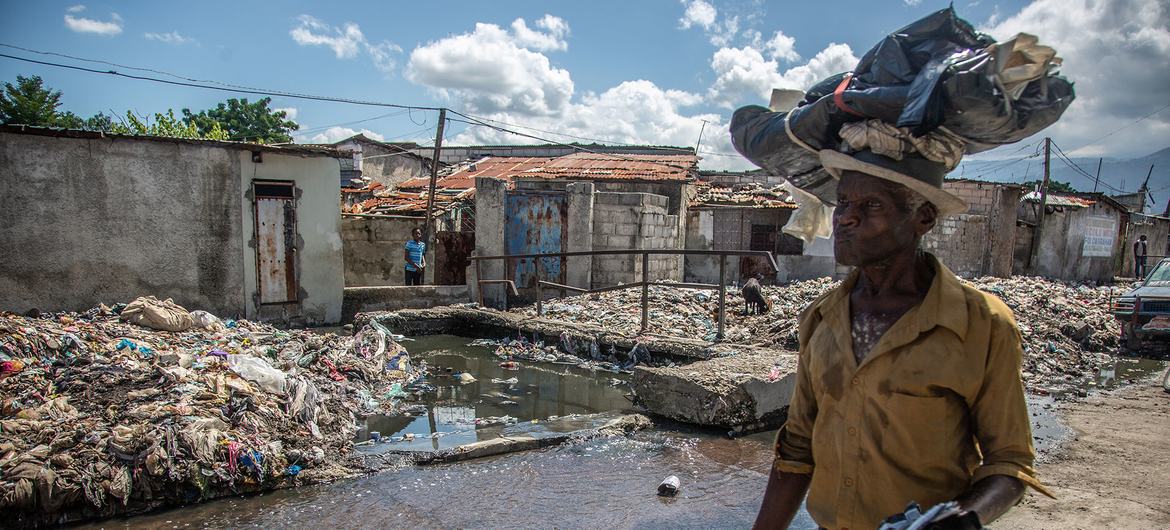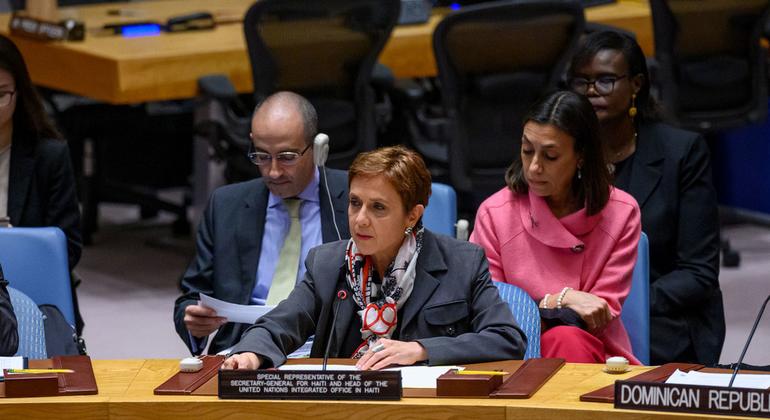Gang violence is expanding at an alarming rate in areas previously considered relatively safe in the capital, Port-au-Prince, and outside the city, with a shocking increase in criminality and abuses, and a police force that is unable to handle the situation.
At the same time, almost half the population, 5.2 million people, needs humanitarian aid, amid an ongoing cholera epidemic that has generated nearly 40,000 suspected cases since October.
Act now
She warned that any further delay in addressing the “unprecedented insecurity” in Haiti could lead to a spill-over in the region.
“Time is of the essence, and the Haitian people deserve your urgent action. If not supported, the vicious circle of violence, political, social, and economic crisis, in which the people struggle every day, will continue to turn,” she said.
Ms. Salvador was appointed in March and took up her post this month. She spent the first week meeting with civil society representatives, particularly women’s groups, national authorities and senior government officials.
“During my initial exchanges and interactions, I observed that a path for Haitians to engage in dialogue towards restoring democratic institutions in the country has been charted. However, the general sentiment is that it will be difficult to move forward without effectively addressing rampant insecurity,” she said.
Gangs terrorize citizens
The envoy also managed to circulate through some of the streets of the capital in the early days of her arrival, saying “I felt the tension and recognized the fear Haitians experience every day.”
She told ambassadors that the horrific violence in gang-ridden areas, including sexual violence particularly targeting women and girls, is emblematic of the terror afflicting much of the population.
During the first quarter of the year, 1,647 criminal incidents – homicides, rapes, kidnappings and lynching – were recorded, according to data from the Haitian National Police and the UN mission in the country, BINUH, which she heads.
The figure is more than double the number recorded during the same period in 2022, and last month saw the highest incident rates in nearly two decades.
Police force ill-equipped
In the face of limited or no police presence, some residents in the capital have begun to take matters into their own hands. This week, 13 suspected gang members were beaten and burned to death by a group of civilians.
Although the Government continues to invest in the Haitian National Police, the force is severely understaffed and ill-equipped to address the violence and criminality, she said.
The number of officers in the ranks is supposed to be nearly 14,800 but when taking into account deaths, dismissal or an increasing number of resignations, the current strength stands at 13,200, with only around 9,000 performing police tasks.
Furthermore, barely 3,500 officers are on public safety duty at any given time nationwide, and recruitment has been halted due to deteriorating security and logistical constraints.
“I would like to emphasize the urgent need for the deployment, authorized by the Security Council, of an international specialized force, as articulated by the Secretary-General in his letter dated 8 October 2022. We need to find innovative ways to define the force to support the Haitian National Police,” she said.

A man walks through Cité Soleil, one of the neighbourhoods of Haiti’s capital, Port-au-Prince, most affected by gang violence.
Sexual violence, kidnappings and killings
Haitians have also continued to suffer one of the worst human rights crises in decades, with people living in areas under gang control exposed to the highest rate of abuses.
Gangs continue to use sexual violence, including gang rape, to terrorize and inflict pain on populations living in areas controlled by their rivals. They have also inflicted other forms of sexual violence and exploitation against women and girls living in communities under their influence.
Ms. Salvador said children are among the victims of the most heinous crimes, including killings, kidnappings and rape. They have been struck by stray bullets while in class or when being dropped off at school.
Furthermore, many schools were forced to close last year due to the violence and extortion by gangs. Although most have reopened, many students have not returned, either because of insecurity or inability to pay.
Weapons and drugs trafficking
The Council also was also briefed by Ghada Waly, Executive Director of the UN Office on Drugs and Crime (UNODC), who said the flows of illicit firearms and drugs into Haiti are compounding insecurity and violence.
An agency assessment, published last month, revealed that increasingly sophisticated and high-calibre firearms and ammunition are being trafficked by land, air and sea, into a country with limited maritime control and a lack of border surveillance.
“Heavily armed criminal gangs are targeting critical infrastructure such as ports, grain storage, customs offices, police stations, court houses, prisons, businesses and neighbourhoods. They have also gained control of major highways and roads providing access to the capital,” she said.
Meanwhile, Haiti’s law enforcement and border control challenges make it an attractive hub for drug traffickers shipping mainly cocaine and cannabis to the United States, the Dominican Republic and Western Europe.
Stop illicit flows
“The international community and invested partners need to urgently develop and support large-scale comprehensive actions to assist law enforcement and border management, to prevent illicit flows and help stabilize the situation,” she said.
Ms. Waly noted that the Council has repeatedly stressed the importance of building up the capacity of the Haitian National Police, including its specialized units on borders, drugs and firearms.
She also underlined the need for greater investment in community policing and criminal justice reform to combat corruption and money-laundering.
“Black markets are relying on corruption and patronage networks to thrive, with a complex web of public and private actors implicated in trafficking, while corruption in the criminal justice sector leads to impunity,” she said.
“The conditions for a political process leading to peace can only be achieved when Haiti has the institutions and capacities capable of meeting these challenges.”



